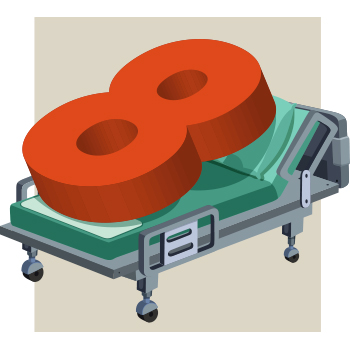
As the dismal statistics bear out, a hospital stay can be hazardous to your health. Among hospitalized Medicare patients alone, the government reports some 15,000 die each month due to a preventable mistake. As an attorney with 30 years’ experience dealing with malpractice, I advise my friends and family to take eight precautions if they or their loved ones have to spend time in the hospital.
Actively Combat the Chance of Contracting an Infection
This is one of the biggest dangers of being in the hospital. Keep a bottle of hand sanitizer with you. Offer it to visitors and staff before they touch the patient. Regularly wipe down surfaces that get touched a lot, like doorknobs and table tops. The Committee to Reduce Infection Deaths lists more precautionary steps.
Scrutinize Prescription Medication Activities
Take prescription bottles with you to make sure hospital staff record information accurately. Write down what is prescribed, how often and in what quantity. Go over your notes with whoever shows up with the next dose to make sure everyone is on the same page. Double check medications before they are given.
Insist on Timely Removal of Catheters
Catheters are often a source of hospital infection and should be removed as quickly as the doctor orders. Make sure this is done.
Be the Squeaky Wheel
If symptoms are getting worse and you can’t get a nurse or doctor to pay attention, go up the hospital food chain: call the supervising nurse, another attending physician or the hospital’s patient advocate. A delayed diagnosis can be fatal.
Stay Vigilant at the Bedside after Surgery
Bleeding or increased difficulty breathing should immediately be brought to the attention of nursing staff and steps taken to resolve it.
Put Your Health above Others’ Feelings
If a friend or family member wants to visit the patient in the hospital but isn’t feeling well, ask them to stay home and not to visit.
Use the Right Doctor
Ask about your doctor’s experience. Statistics show the more often a doctor has performed a procedure, the better the outcome. Also, confirm your doctor is board-certified in his or her specialty.
Be Pleasant but Persistent
Experience shows that a kind word and a smile can get the attention of an overworked nurse better than a complaint. Let the staff know you appreciate everything they do, then keep asking any question that nags at you until you get a full answer.
Hospitals across the country are paying more attention to preventable mistakes because of new federal rules that prohibit hospitals from charging for treatment that was provided as a result of a serious event in the hospital, such as an infection from a bedsore or a medication error. But medication mistakes and hospital-acquired infections still occur in epidemic proportions. Consumers can keep themselves and their families safer by being proactive while in the hospital.
If you or a loved one was injured or contracted a life-threatening illness while in hospital care, contact our trusted medical malpractice lawyers. We’d be happy to discuss the details or your potential case.
RELATED POSTS
MRSA Infection: When Can Medical Professionals be Held Liable?
